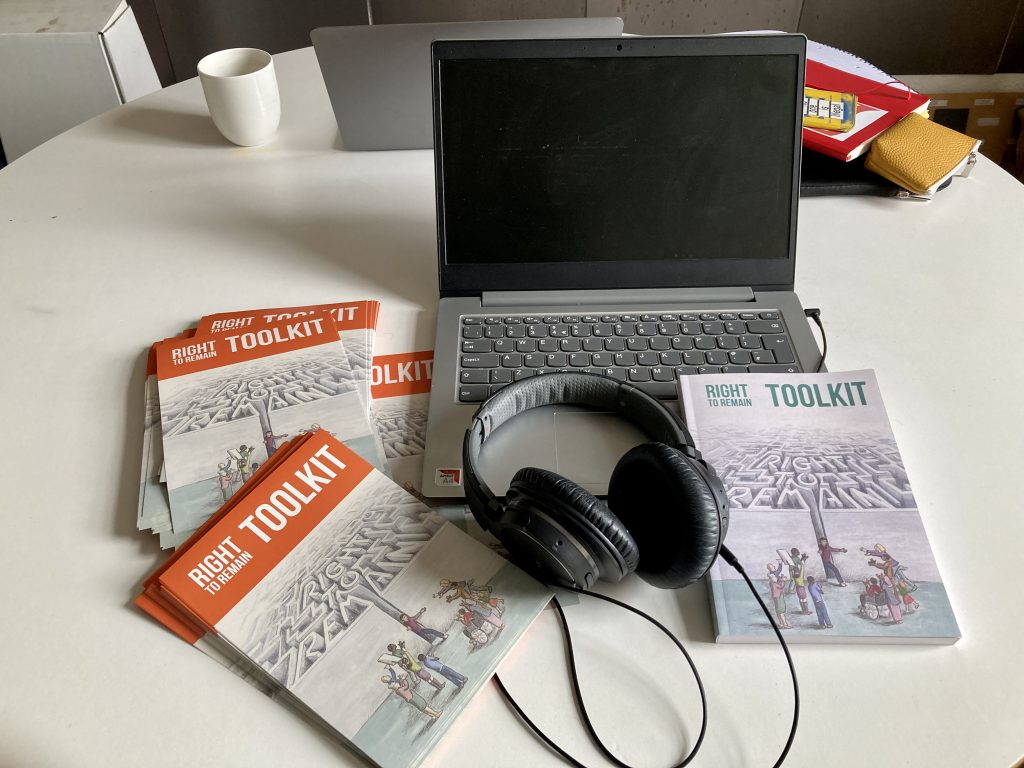
Two months ago, Right to Remain team ran two Knowledge is Power online workshops on 13 June 2022, during the Solidarity Knows No Borders’ Week of Action to End the Hostile Environment.
Many of you who are reading this blog must be already familiar with the Right to Remain Toolkit. Over the years, it has equipped many people going through the hostile immigraiton and asylum legal system in Britain with practical knowledge and confidence to navigate it.
As the movement to end the Hostile Environment gathers pace, our work continues. And during the Week of Action, we wanted to introduce our Toolkit to new joiners and new audiences, to build our community legal literacy and help them begin to understand the system that they wish to challenge.
What did the workshops cover?
Quickly, we realised that our initial estimate of “10 participants per workshop” was wrong. Very wrong. Nearly 100 people, including These Walls Must Fall supporters, booked their places which sent us into a mini panic.
Our Knowledge Is Power workshops covered three main topics:
1) How to actually use the Toolkit – We showed how the Toolkit is structured and how people can navigate this massive resource. This included, for example, showing on the computer screen where people can find our videos or Asylum Navigation Board or how people can use the Google Translate (can you spot where it is on the Toolkit webpage?) to translate the material into the language of their choice. This was in response to the feedback some of you gave us – that the Toolkit is great, but it can be overwhelming because there is so much information in it.
2) Stages of the asylum process – Through our group exercises, we provided an overview of the asylum process, including an explanation for each stage, such as ‘screening interview’ and ‘substantive interview’. This prompted our participants to share their own experiences in the chat box, to which others responded or asked further questions. It can be challenging to have interactions on Zoom, but our participants were relaxed and generous which created a wonderful atmosphere of group learning.
3) Difference between legal advice and legal support – In the present context where the provision of immigration and asylum legal advice is expected to remain poor for the foreseeable future (there is a bigger question of will it ever return back to its previous level…) and people are likely to be stuck in the system longer because of a huge backlog at the Home Office, Right to Remain is exploring ways to scale up the amount of legal support available in the community as quickly as possible. We repeatedly hear from people supporting others going through the immigration and asylum process that they are worried about unintentionally giving legal advice.
For example, one of the workshop participants said:
“I think that most groups are very wary of offering anything close to support or advice so we are told to not say anything and link it to the immigration lawyers.”
The last section of the workshop therefore focused on explaining the difference between legal advice and legal support, using a group exercise and discussion, so that people feel more confident about providing legal support, while avoiding giving legal advice.
Feedback from participants
The workshops had a good mix between people who are going through the system and people who are trying to support them, with varying levels of knowledge base. Some have recently started getting involved in this solidarity work, while others have been supporting people in the system for a long time. Questions and comments from the participants covered a wide range of topics, which also taught us a lot about how our community is trying to protect themselves from the potential harm of the immigration and asylum system.
One participant asked “What was different in the asylum process before the hostile environment?” This was a timely reminder that those of us who have been in this struggle for a long time have a duty to explain the reality to the newcomers, that even before a suite of “hostile environment” policies were introduced, the system was already hostile. Our ambition must not end at dismantling the Hostile Environment borne out of a punitive world, but extend to building an alternative society based on dignity, justice, solidarity and welcome.
After the workshops, many participants told us that they will be using the Toolkit (more) in the future – which is precisely what we wanted to hear. We also received numerous requests from groups asking if Right to Remain could run bespoke workshops for their groups. One feedback said “Many thanks for this really helpful workshop and for putting together the online Toolkit which can be consulted 24/7.”
Observing the interactions between the participants gave us a sense of hope, that more and more people in the community are coming together in solidarity with others to fight this system.
Moving forward
We have got a lot more work to do. Right to Remain has begun running regular online workshops. More workshops will be announced in the future, so stay tuned!
Right to Remain is part of the Solidarity Knows No Borders network, a community of migrant organisations, groups and individuals, working in solidarity to end hostility and racism against migrants and refugees. As a community, we organise and strategise, share resources to build collective campaigns and actions.
We show up in solidarity with each other; for both short term and long term change. Whether you are someone with lived experience of the immigration system, or someone who wants to take action in solidarity, this is the network for you.













Discussion: